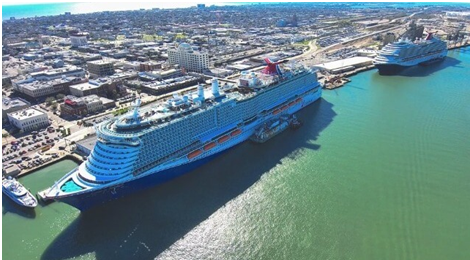
In 2012,
liquefied natural gas (LNG) as a marine fuel was a budding contender in the
maritime industry, holding less than one percent market share.
At the same
time, NASA's Aura satellite, equipped
with an Ozone Monitoring Instrument, finished capturing images of elevated
nitrogen dioxide (NO2) levels along shipping lanes, highlighting the
environmental impact of traditional marine fuels. These oxides of nitrogen
(NOx) are known to produce fine particles and ozone, significantly harming
cardiovascular and respiratory health—a
concern underscored by the World Health Organization, which attributes
approximately seven million premature deaths annually to air pollution.
The
landscape has dramatically shifted forward since then: 469 LNG-fueled ships are
now in operation with an additional 537 newbuilds on order. This surge places
LNG at the forefront of the alternative fuel orderbook, as reported by DNV.
LNG's appeal lies in its ability to
cut greenhouse gas emissions by 23 percent, sulfur emissions by 99 percent and
nitrogen oxide emissions by nearly 99 percent. This is done by purifying and
super-cooling natural gas to reduce its volume by 600 percent, enabling efficient
transport and storage.
In the
“basket of alternative fuels,” LNG stands out for its environmental benefits,
established infrastructure and the industry's commitment to future-proofing
maritime operations through significant investments.
Benson
Peretti, Executive Vice President of Seapath asks, "LNG has been called a ‘bridge,’
but when does the 'bridge' become the 'road'?"
Considering
LNG's more than a decade of use—nearly half the lifecycle of many ships—this question hints at the broader
implications of shifting trade routes and the resonating effects of LNG
infrastructure investments, which could yield unknown yet impactful dividends.
The
dual-fuel Carnival Jubilee, the first new ship to homeport in
Galveston, showcases the cruise industry's dedication to LNG. The vessel has
secured fuel services with Stabilis Solutions and Seaside LNG, utilizing a
specially equipped barge for LNG delivery.
The
arrangement highlights the operational flexibility of the Jubilee which, aside
from running on LNG, is able to use traditional marine diesel fuel as well,
ensuring a seamless transition toward cleaner energy sources.
Pivotal
LNG, a subsidiary of Berkshire Hathaway Energy, a conglomerate known for
its comprehensive involvement in natural gas processing, pipelines, storage and
LNG production, recognizes LNG as the
most viable marine fuel solution for the North American market in the immediate
future.
Pivotal
LNG operates three key facilities—JAX LNG, a joint venture between Pivotal LNG
and Seaside LNG in Jacksonville, Florida, Towanda LNG and Trussville LNG—collectively producing 470,000 gallons per
day and boasting nine million gallons of storage capacity along the East Coast.
JAX LNG
is the pioneering facility, completing over 650 marine
bunkerings including the M/V Isla Bella. With the additional access
to Jones Act LNG bunker barges owned by Seaside LNG, the Clean
Canaveral and Clean Everglades, JAX LNG is a leader in the LNG fueling space.
In the maritime industry's journey to
sustainability, LNG has evolved from a transitional “bridge” to potentially
becoming the “road” to the future. Infrastructure developments in fueling
operations like the Galveston LNG Bunker Port (GLBP) and JAX LNG underscore the
sector's commitment to cleaner energy.
With significant
investments from industry giants like Royal Caribbean, which signal a broader
shift toward LNG, ports like Galveston are poised to play a crucial role in
accommodating LNG-fueled vessels.
This
collective move toward LNG reflects the industry's dedication to a sustainable
future. It redefines trade routes and operational strategies, marking a
significant step in the maritime sector's embrace of LNG as a foundational fuel
choice. – MarEx